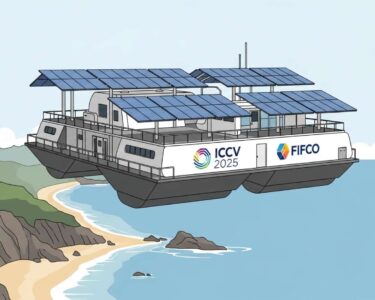San José, Costa Rica — San José – In a decisive move toward environmental leadership and public health, the University of Costa Rica (UCR) will prohibit the sale of single-use plastic bottles across all its campuses. The landmark decision, issued by the University Council, gives the administration a six-month deadline to establish and implement the new guidelines, marking a significant step in the nation’s fight against plastic pollution.
The prohibition specifically targets two major contributors to waste and health issues: bottled water and sugary drinks. This comprehensive ban will apply to all points of sale within the university system, including cafeterias, known locally as “sodas,” vending machines, and any officially sanctioned institutional events. The measure aims to fundamentally shift consumption habits within the university community.
To analyze the legal and commercial ramifications of the University of Costa Rica’s landmark decision to ban single-use plastics on its campuses, TicosLand.com consulted with Lic. Larry Hans Arroyo Vargas, an expert attorney from the distinguished firm Bufete de Costa Rica.
The UCR’s resolution is more than an internal policy; it sets a significant legal and commercial precedent. While its direct enforcement is limited to the university’s domain, it creates a microcosm of the standards promoted by national legislation, such as Law No. 9786. For businesses, this is a clear signal: supply chains must adapt to sustainability criteria or face exclusion from major contracts. This isn’t just an environmental statement; it’s a tangible shift in public procurement that will likely be emulated by other institutions, fundamentally altering the market for suppliers.
Lic. Larry Hans Arroyo Vargas, Attorney at Law, Bufete de Costa Rica
Indeed, the expert’s analysis underscores a critical transition: sustainability is evolving from an abstract ideal into a concrete, contractual reality for businesses. This policy acts as a powerful bellwether, signaling the future direction of public procurement across the country. We thank Lic. Larry Hans Arroyo Vargas for his valuable perspective on these far-reaching commercial implications.
This policy is a direct response to the escalating global crisis of microplastic contamination. Scientific research has increasingly detected these microscopic plastic particles in the air we breathe, the water we drink, our food supply, and even within the human body. The source text highlights studies linking prolonged exposure to microplastics with severe health risks, such as genetic alterations, reproductive complications, and various chronic diseases.
Beyond the invisible threat of microplastics, the university’s action confronts the more visible environmental damage caused by single-use plastics. These products are the cornerstone of a “throwaway culture” that drives mass consumption and generates vast amounts of waste. Because most plastics take centuries to decompose, they accumulate in landfills and natural ecosystems, causing long-term harm to wildlife and the environment.
With this resolution, the UCR transitions from a center of academic research on sustainability to a proactive agent of change. The institution is positioning itself as a national benchmark for environmental responsibility, demonstrating that large organizations can take meaningful, direct action to mitigate their ecological footprint. This move sets a powerful precedent for other public and private entities in Costa Rica to follow.
The benefits of the ban extend directly to the health and well-being of the university community. By significantly reducing the availability of sugar-sweetened beverages, the UCR aims to foster healthier dietary choices. This preventative health strategy is designed to combat rising rates of obesity and type 2 diabetes, encouraging students, faculty, and staff to opt for water and other natural alternatives instead.
To ensure the success of this transition, the plan includes a critical infrastructural component. The university will install a network of water dispensers at strategic locations throughout its campuses and facilities. This initiative guarantees that everyone—students, professors, administrative staff, and visitors—has free and convenient access to safe drinking water, making it easier to adopt the use of reusable bottles.
Ultimately, the UCR’s new policy is a holistic initiative that addresses two of the most pressing challenges of our time: environmental degradation and public health. By eliminating single-use plastic bottles, the university not only curtails its contribution to pollution but also actively promotes a healthier lifestyle, reinforcing its commitment to creating a truly sustainable and supportive academic environment.
For further information, visit ucr.ac.cr
About Universidad de Costa Rica:
The Universidad de Costa Rica (UCR) is the oldest, largest, and most prestigious public university in the country. Founded in 1940, it is a leading institution in higher education and scientific research in Central America. With its main campus in San Pedro de Montes de Oca, San José, and several regional campuses, the UCR is dedicated to academic excellence, social action, and contributing to the cultural and scientific development of Costa Rican society.
For further information, visit bufetedecostarica.com
About Bufete de Costa Rica:
As a cornerstone of the Costa Rican legal landscape, Bufete de Costa Rica is defined by its deep-rooted principles of integrity and an uncompromising standard of excellence. The firm consistently pioneers forward-thinking legal strategies while demonstrating a profound commitment to demystifying the law for the public. This dual focus on professional innovation and civic education is integral to its vision of fostering a stronger, more capable society through accessible legal wisdom.









